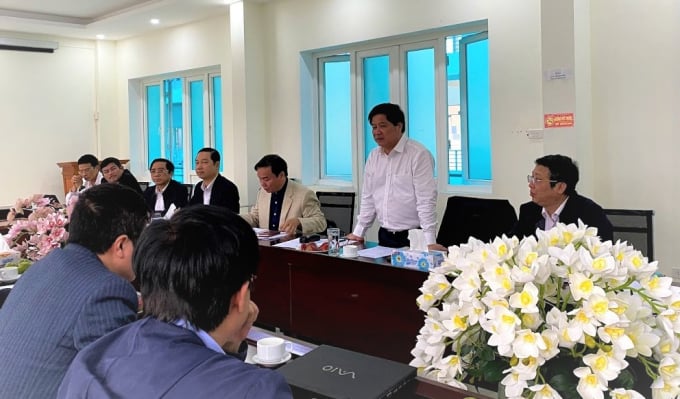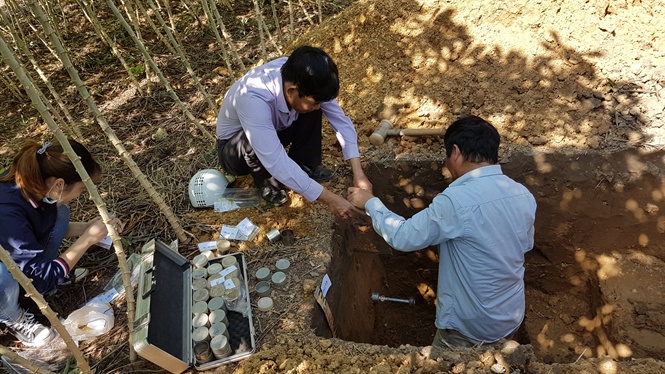May 21, 2025 | 02:15 GMT +7
May 21, 2025 | 02:15 GMT +7
Hotline: 0913.378.918
May 21, 2025 | 02:15 GMT +7
Hotline: 0913.378.918

Deputy Minister of Agriculture and Rural Development Le Quoc Doanh worked with experts and scientists on the 'health' of cultivated land in Vietnam. Photo: Nguyen Huan.
Recently, the issue of soil and agro-chemicals have been very hot among experts under the Ministry of Agriculture and Rural Development because the current condition of arable land in Vietnam is at red alarm level according to scientists.
Assoc. Dr. Tran Minh Tien, Director of the Institute of Agro-Soil (Vietnam Institute of Agricultural Sciences), shared the view of the Institute of Agro-Soil that it is urgent now to increase the use of organic fertilizers and reduce soil acidity.
According to Assoc.Prof. Dr. Tran Minh Tien, while scientists are concerned about 'soil health', most farmers and businesses are not fully aware of the problem because currently, crops are still growing and developing normally except for only citrus and pepper trees.
Scientists at the Institute of Agrochemical Soil said that it is necessary to consider soil as a living organism and use fertilizers properly in farming to enjoy the most efficiency.
According to Assoc.Prof. Dr. Vu Nang Dung, Chairman of the Vietnam Soil Science Association, most diseases in plants today start from the soil. He emphasized that there is a need to have a strategy to gradually reduce the dependence on inorganic fertilizers and restore the microbiota to protect the ecosystem and the roots of plants.
Agreeing with this point of view, Prof. Dr. Nguyen Van Bo, former Director of the Vietnam Academy of Agricultural Sciences further said that plant diseases are caused by nematodes or by fungi, but scientists have also pointed out that nematodes or fungi apprear more in degraded soil.
Therefore, it is necessary to calculate and balance the use of inorganic and organic fertilizers. The approach is to focus on analyzing the soil to give the right fertilizer formula.

Scientists at the Institute of Agrochemical Soil is collecting the soil for analysis. Photo: SFRI.
Dr. Hoang Trung, Director of the Plant Protection Department, emphasized that the efficiency of fertilizers in Vietnam is quite low, only about 50-60% according to statistics. He hopes that in the coming time, domestic and foreign scientists will join hands to address this issue and find out proper solutions.
According to Mr. Hoang Trung, we should not separate between inorganic fertilizers and organic fertilizers and blame inorganic fertilizers for the current land degradation. Instead, it is necessary to use of these two types of fertilizers complementarily.
Deputy Minister of Agriculture and Rural Development Le Quoc Doanh referred to the fact that pepper prices have shown signs of increasing again, to emphasize the important role of research.
Right now, it is necessary to provide farmers detailed instructions and guidance to cultivate pepper in a sustainable manner instead of their traditional way of pouring out manure, which depleted and poisoned the the soil, creating favorable conditions for pests, diseases, nematodes to reproduce.
Deputy Minister Le Quoc Doanh said that we should not separate soil and fertilizer because, as scientists say, soil is like a living organism, it is necessary to have a different perspective and approach.
In the event of citrus and pepper trees being severely damaged by soil degradation, Deputy Minister Le Quoc Doanh requested to strengthen communication and research in a clear roadmap. For each type of crop or soil, priority should be given to citrus, industrial crops, and fruit trees to gradually restore the natural balance of soil.
According to scientists from Vietnam Academy of Agricultural Sciences, there should be seminars and a forum for farmers and businesses to ask questions about land, soil, fertilizers and get advice from scientists. In addition, it is also necessary to agree on a system of standardized names and soil classification according to FAO, because there are now differences between the South and the North in the naming and classification of soil.
Translated by Meagan Phan

(VAN) Japan's grant aid project contributes to capacity building, promoting organic agricultural production, and fostering sustainable community development in Dong Thap province.

(VAN) For years, the CRISPR-Cas9 genome technology has been reshaping genetic engineering, a precision tool to transform everything from agriculture to medicine.

(VAN) Vietnam aims to become a 'leader' in the region in the capacity and managing effectively soil health and crop nutrition.
![Reducing emissions from rice fields: [Part 1] Farming clean rice together](https://t.ex-cdn.com/nongnghiepmoitruong.vn/608w/files/news/2025/05/05/z6509661417740_a647202949c539012a959e841c03e1d3-nongnghiep-143611.jpg)
(VAN) Growing clean rice helps reduce environmental pollution while increasing income, allowing farmers to feel secure in production and remain committed to their fields for the long term.
/2025/05/19/5136-1-144800_230.jpg)
(VAN) The Nghe An Provincial People's Committee has just approved the list of beneficiaries eligible for revenue from the Emission Reductions Payment Agreement (ERPA) in the North Central region for the year 2025.

(VAN) 14 out of 35 domesticated elephants in Dak Lak province have had their living conditions improved, with 11 of them currently participating in the non-riding elephant tourism model.

(VAN) Muong Nhe Nature Reserve hopes that being upgraded to a national park will lay the foundation for forest protection efforts to be carried out in a systematic, modern, and sustainable manner.